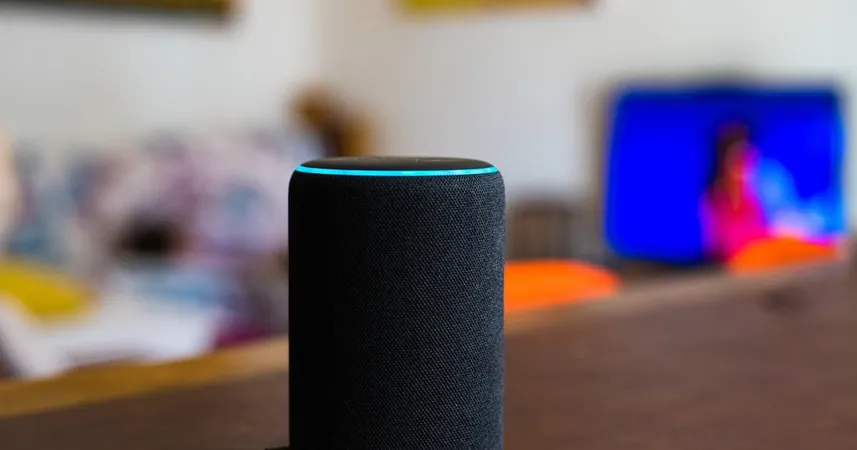
Amazon's Bold Move: Transforming Alexa with Cutting-Edge Generative AI
2025-01-16
Author: Charlotte
Amazon's Ambitious Overhaul of Alexa
Amazon is on a mission to revolutionize its Alexa voice assistant, transitioning it into a highly advanced artificial intelligence “agent” capable of performing an extensive range of practical tasks. This ambitious overhaul comes as the tech giant seeks to overcome significant challenges that have plagued its AI transformation efforts.
For the past two years, the trillion-dollar company has been working to upgrade Alexa, which is currently embedded in over 500 million devices globally. The goal is to replace the existing “brain” of the system with generative AI, enhancing its capability beyond simple functions like playing music or setting alarms.
Technical Challenges and Solutions
Rohit Prasad, the head of Amazon's artificial general intelligence team, has voiced the necessity of addressing several technical obstacles before launching the upgraded version. Key issues include the infamous “hallucinations”—where AI fabricates responses—along with improving response speed and reliability. According to Prasad, “Hallucinations have to be close to zero… it’s an open problem in the industry, but we are working extremely hard on it.”
Amazon envisions transforming Alexa into a more bespoke digital assistant—an “agentic” product that can perform tasks ranging from recommending restaurants to adjusting home lighting based on an individual’s sleep patterns. The reimagining of Alexa comes in the wake of the launch of OpenAI's ChatGPT, which has led competitors like Microsoft and Google to quickly integrate generative AI into their services.
Concerns and Criticism
Despite the growing pressure, many within Amazon have expressed concerns about whether the company can solve its technical and organizational challenges in time to compete effectively. Reports from former employees indicate that the transition from Alexa's original algorithms to more scalable large language models has been fraught with unexpected complexities.
Addressing these challenges is no small feat, as Amazon acknowledges the unprecedented nature of this implementation. Prasad highlighted the richness of Alexa's ecosystem, mentioning that it integrates hundreds of third-party services, and emphasized the need for cost-effective operations that can handle billions of weekly requests.
Maintaining Original Functions and Personality
Moreover, preserving Alexa's original functionalities while infusing it with the creative capabilities of generative AI poses another significant challenge. To ensure that the AI remains familiar to users, Amazon plans to hire professionals who will focus on developing the assistant’s personality, voice, and speech patterns.
Risks and Safety Concerns
However, there’s a risk attached to the sophistication of large language models—occasionally producing completely fabricated answers, which could potentially harm Amazon’s reputation on a large scale. Mihail Eric, a former machine learning scientist at Amazon, has openly criticized the company for failing to establish itself as the leader in conversational AI, citing technical mishaps and bureaucratic hurdles as major setbacks.
Compounding the challenges is the need to ensure that the newly designed AI maintains a high level of reliability while addressing safety concerns. Andrew Amodei, CEO of Anthropic, which has collaborated with Amazon, pointed out that building trust in AI systems is essential before they can be widely released.
Uncertainty in Development and Financial Implications
While Amazon wrestles with these complexities, third-party developers creating features for Alexa have voiced uncertainty about the timeline for the rollout of the new AI-enabled assistant. Some have noted that communication from Amazon has dwindled, despite an initial push to prepare developers for the next-gen Alexa.
The financial implications of these advancements also loom large over the Alexa team, which faced significant layoffs in 2023. Finding a sustainable business model for an AI-powered assistant remains a daunting task, with ideas ranging from potential subscription services to revenue cuts from various sales.
Looking Ahead
Amidst all these changes, Prasad reiterated the importance of focusing not just on innovation for its own sake, but on delivering practical AI solutions that provide tangible value to customers. As the landscape of generative AI continues to evolve, Amazon's efforts to reinvigorate Alexa could very well reshape the future of personal digital assistants.
Stay tuned as we continue to monitor this developing story—could Amazon's Alexa emerge as the ultimate AI companion? The answer lies in their ability to overcome these formidable challenges!









 Brasil (PT)
Brasil (PT)
 Canada (EN)
Canada (EN)
 Chile (ES)
Chile (ES)
 Česko (CS)
Česko (CS)
 대한민국 (KO)
대한민국 (KO)
 España (ES)
España (ES)
 France (FR)
France (FR)
 Hong Kong (EN)
Hong Kong (EN)
 Italia (IT)
Italia (IT)
 日本 (JA)
日本 (JA)
 Magyarország (HU)
Magyarország (HU)
 Norge (NO)
Norge (NO)
 Polska (PL)
Polska (PL)
 Schweiz (DE)
Schweiz (DE)
 Singapore (EN)
Singapore (EN)
 Sverige (SV)
Sverige (SV)
 Suomi (FI)
Suomi (FI)
 Türkiye (TR)
Türkiye (TR)
 الإمارات العربية المتحدة (AR)
الإمارات العربية المتحدة (AR)